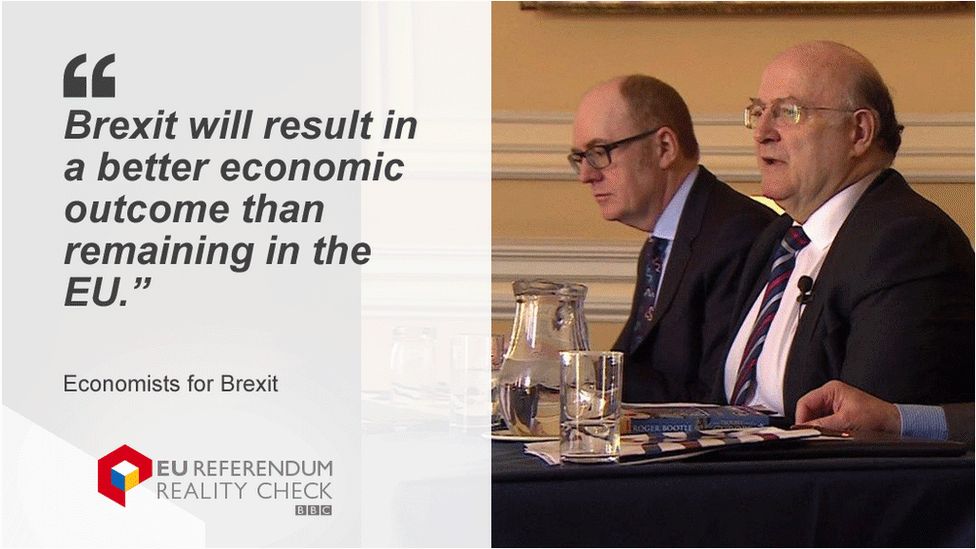Reality Check: Would Brexit be good for the UK economy?
- Published

The claim: Leaving the EU would make the UK economy grow more than staying in.
Reality Check verdict: This is not a mainstream view - but they are reputable economists. It is an optimistic vision of how the UK economy might fare outside the EU, although some of its assumptions are questionable.
A group of eight well known economists have released a report under the banner of Economists for Brexit, explaining how they think leaving the EU would be good for the UK economy.
They predict that, in 2020, the UK economy would grow 3.4% if the UK left the EU, while it would grow only 2.5% if the UK remained.
Their conclusions are outside the current economic mainstream on Europe, with most models assuming that free trade, free movement and open economies are automatically a good thing.
While we have previously warned about the uncertainties involved in economic modelling, that is why it is no surprise organisations such as the IMF, the Organisation for Economic Co-operation and Development (OECD), the Treasury and the Centre for Economic Performance (CEP) have all predicted considerable losses to the economy following a Brexit.
This means the Economists for Brexit have had to demonstrate in their paper that the EU is restricting UK trade.
The basis of their assumptions is that after leaving the EU, the UK would trade under World Trade Organisation rules and immediately drop all tariffs on imports from everywhere in the world to reduce the prices of products for people in Britain.
One problem with this is that they also predict a fall in the value of the pound, which would be good news for exporters, but bad news for UK consumers buying imported goods.
The weaker pound might go some way to making up for the likelihood that EU countries would impose tariffs on UK exports, which is included in the model.
How does this compare with other models?
The analysis from the CEP, an influential group based at the London School of Economics, considered what would happen if the UK unilaterally removed all tariffs.
It still predicted a negative effect on the economy from leaving the EU, but said going tariff-free improved the outcome by 0.3 percentage points.
Another problem with the Economists for Brexit report is it says the UK currently sends 70% of its exports to countries with which we have no free trade agreement, so trading that way with the other 30% should not be too hard.
We've looked at this claim before, and, as we know about 44% of UK exports go to the EU, there is no way 70% can go to countries with which we do not have free trade arrangements (see below for update on this figure).
The report assumes the UK's net EU Budget contribution of 0.8% of gross domestic product (GDP) would be used to cut income tax.
It also assumes a big benefit from reduced regulation, although there has been some doubt about how much regulation could be reduced if the UK left the EU and wanted to continue trading with it.
Among the areas the report highlights as having too much regulation is energy.
"European governments have been more emphatic than the global average about the dangers of climate change," the report says.
It also talks about saving companies money by reducing social regulation such as the Working Time Directive and Gender Equality Directive and getting rid of "interferences" with financial regulation such as the cap on bankers' bonuses.
But the extra growth predicted for the economy in this study is not big.
And the margin of error with such forecasting is large.
So it should be remembered that the difference between a small increase as this model predicts and a small fall as others suggest is well within the range of uncertainty of the methods used here.
UPDATE 3 May
We've had an explanation from Prof Patrick Minford of where the 70% figure comes from.
It is based on there not being a free trade agreement covering services (that's things like insurance, cleaning or hairdressing where goods are not involved) in the EU.
So the 70% covers all our exports of services - including to other EU member states - and about half our exports of goods.
This ignores the EU's freedom of movement, which is particularly beneficial to the service sector and it's fair to say contributes to the level of services exported to other EU countries. There are also rules in financial services such as passporting, which helps banks to export.
To be fair, Prof Minford does sometimes phrase the statistics to make them clear, like this: "We already sell all our non-EU exports and all our exports of services around the world under WTO rules, about 70% of all our exports."
But in the Economists for Brexit press release he is quoted as saying: "70% of our exports are traded outside the EU already under World Trade Organisation rules", which is not the case.
We've also heard Boris Johnson phrase it like this: "Don't forget that 70% of our trade currently takes place with countries with whom we have no trade deals at all."
So as is often the case, it is the words that give the wrong impression, even if the numbers can be justified.
- Published28 April 2016
- Published28 April 2016
- Published22 February 2016